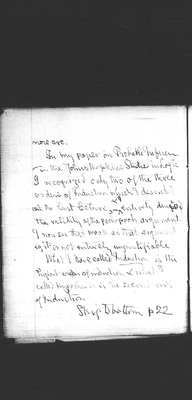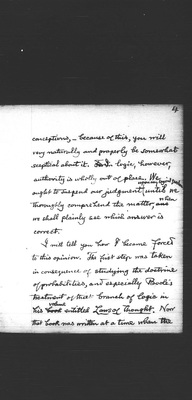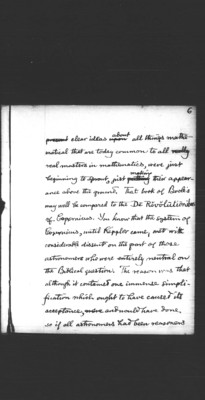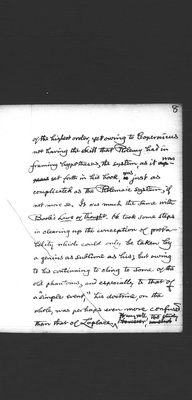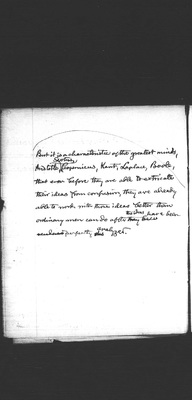Pages
6
now are.
In my paper on Probable Inference in the Johns Hopkins Studies in Logic I recognized only two of the three orders of Indiction which I described at the last lecture,— and I entirely denied the validity of the pooh-pooh argument. I now see that weak as that argument is, it is not entirely unjustifiable.
What I have called Induction is the highest order of induction and what I called Hypothesis is the second order of Induction.
[Skip to bottom p 22]
7
4
conceptions,— because of this, you will very naturally and properly be somewhat sceptical about it. In logic, however, authority is wholly out of place. We ought to suspend our judgment upon any logical questions until we thoroughly comprehend the matter, when we shall plainly see which answer is correct.
I will tell you how I became forced to this opinion. The first step was taken in consequence of studying the doctrine of probabilities, and especially Boole's treatment of that branch of logic in his volume entitled Laws of Thought. Now that book was written at a time when the
8
6
clear ideas about all things mathematical that are today common to all real masters in mathematics, were just beginning to sprout, just making their appearance above the ground. That book of Boole's may well be compared to the De Revolutionibus of Copernicus. You know that the system of Copernicus, until Keppler came, met with considerable dissent on the part of those astronomers who were entirely neutral on the Biblical question. The reason was that although it contained one immense simplification which ought to have caused its acceptance, and would have done so if all astronomers had been reasoners
9
8
of the highest order, yet owing to Copernicus not having the skill that Ptolemy had in framing hypotheses, the system, as it was set forth in his book, was just as complicated as the Ptolemaic system, if not more so. It was much the same with Boole's Laws of Thought. He took some steps in clearing up the conception of probability which could only be taken by a genius as sublime as his; but owing to his continuing to cling so some of the old phantoms, and especially to that of a “simple event,” his doctrine, on the whole, was perhaps even more confused than that of Laplace. At any rate, the study
10
But it is characteristic of the greatest minds, Aristotle, Scotus, Copernicus, Kant, Laplace, Boole, that even before they are able to extricate their ideas from confusion, they are already able to work with those ideas better than ordinary men can do after the ideas have been perfectly analyzed.
